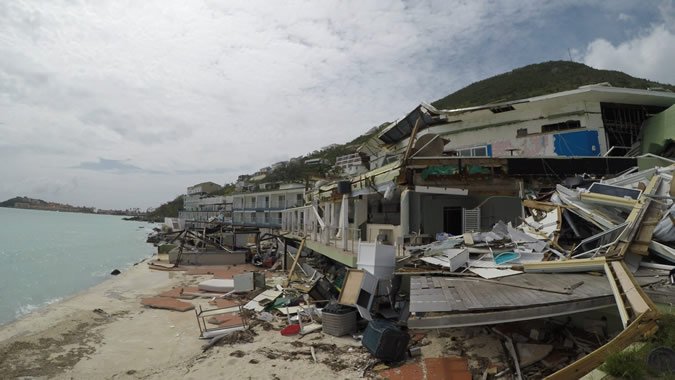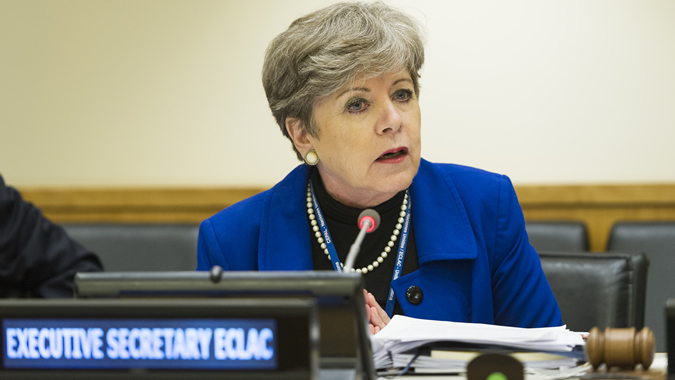ECLAC Advocates for Caribbean's Debt Swap Proposal and Establishes Task Force for Its Implementation
Work area(s)
The UN Commission recently presented the initiative at the CARICOM-UN High Level Pledging Conference held in New York.

Representatives from the Economic Commission for Latin America and the Caribbean (ECLAC) presented on Monday 20 November the organization’s debt for climate adaptation swaps proposal for the Caribbean nations striken by the recent hurricane season, during a high level conference held in the United Nations’ headquarters in New York.
The CARICOM-UN High Level Pledging Conference: “Building a more Climate Resilient Community”, was convened by the Caribbean Community (CARICOM), with support from the United Nations Development Programme (UNDP), and looked to mobilise international support for its Members devastated by Hurricanes Irma and Maria last September. Especially, financial and technical assistance support was being sought.
The conference highlighted vulnerabilities of the CARICOM SIDS (Small Island and Low-lying Coastal Developing States) and provided an opportunity for the affected countries to share a vision for achieving the ambition of becoming climate resilient nations.
CARICOM Heads of Government and the Secretaries-General of CARICOM and several United Nations’ organizations participated in the meeting, along with international development partners, including countries, agencies, non governmental organizations (NGOs), prominent personalities, private sector entities and foundations.
The ECLAC delegation was composed of the Director of the Commission’s Subregional Headquarters for the Caribbean, Diane Quarless, and the Director of ECLAC’s Economic Development Division, Daniel Titelman.
Diane Quarless described the actions taken in the five countries for which ECLAC conducted its Damage and Loss Assessments (DALA) methodology post Irma and Maria: Anguilla, the Bahamas, British Virgin Islands, Sint Maarten and the Turks and Caicos Islands.
She stated that the most vulnerable countries are already facing the impact of climate change. “It is estimated that 70% of the beaches in the subregion are losing shoreline at a rate of between one quarter and nine meters each year. This is more serious when you consider that about 70% of Caribbean populations, dwellings and infrastructure are situated on low-elevation coastal zones”, she added.
Quarless also emphasized that ECLAC has undertaken substantive research and focused economic assessments of the challenge which climate change poses to the economies of the Caribbean across a range of sectors, including agriculture, freshwater, health and tourism, providing a framework complete with data, parameters and other measures that can be used to inform economic policy dialogue in responding to this challenge over the medium term.
Is for these reasons that ECLAC has been championing a debt for climate adaptation swap initiative, she explained. “This is our contribution to addressing at once the crippling debt of the Caribbean economies and their need to generate the resources needed to finance resilience building measures”, Diane Quarless stressed.
The debt swap initiative, which was originally launched in late 2015 and first presented at ECLAC’s Caribbean Development Roundtable in Saint Kitts and Nevis early in 2016, is an innovative strategy that involves harnessing concessionary flows to transform the debt of the region into a source of investment in resilience, while at the same time re-energizing growth and promoting economic transformation in the economies of the subregion, through investment in adaptation projects and green industries.
The Debt Swap Task Force was inaugurated at a meeting held in Port of Spain, Trinidad and Tobago, on 24 November 2017. The meeting provided a forum for avid discussion among a group of key Caribbean institutions including the CARICOM Secretariat, the Organization of Eastern Caribbean States, the CARICOM Development Fund, the Eastern Caribbean Central Bank, as well as representatives from national institutions like the Planning Institute of Jamaica.
ECLAC’s proposal is based on the creation of a Caribbean Resilience Fund (CRF) which is expected to provide financing for investment in climate resilience, green growth and structural transformation in the economies of the region.
According to ECLAC figures, the total Caribbean debt burden mounted up to 52 billion dollars in 2015, representing more than 70% of the subregion’s gross domestic product (GDP). This debt has been rooted in external shocks, compounded by the inherent structural weaknesses and vulnerabilities, particularly extreme weather events. The accumulation of debt has been caused by increased expenditures to address the impact of these extreme events and climate change attendant difficulties, since most Caribbean countries are located in the hurricane belt and are also prone to earthquakes and other hazards.
Participants in the 24 November meeting at Trinidad and Tobago sought clarification on the mechanics of the debt swap arrangement, examining closely the likely impact on various stakeholders, and exploring the feasibility of pursuing economic diversification with a view to producing competitive exports that generate foreign exchange and stimulate growth in the economy. Consideration was given to the need to develop a portfolio of green projects and strategies to capitalize the Caribbean Resilience Fund which should serve as the source of financing.
Challenges in addressing domestic debt were also raised. Participants highlighted that it may be more beneficial to focus on the multilateral debt in the first instance, since securing haircuts on the debt from private creditors might be less easy to sell. It was agreed that the launch of this ambitious project should be supported by an aggressive advocacy strategy to popularise the advantages of the debt swap initiative.
Related content

Criteria for Access to Concessional Financing Must Change to Support Caribbean Countries with their Reconstruction
ECLAC’s debt relief proposal for the countries most affected by recent hurricanes was presented by Alicia Bárcena, the organization’s Executive Secretary, at a high-level ECOSOC meeting in New York.

Middle Income Countries Require Differentiated and Fair Access to Financing for Development: Alicia Bárcena
ECLAC’s Executive Secretary participated today in New York in the second high-level ministerial meeting of like-minded nations that support middle income countries.
Subregional headquarter(s) and office(s)
Type
Country(ies)
- Caribbean
Contact
Public Information Unit
- prensa@cepal.org
- (56 2) 2210 2040
